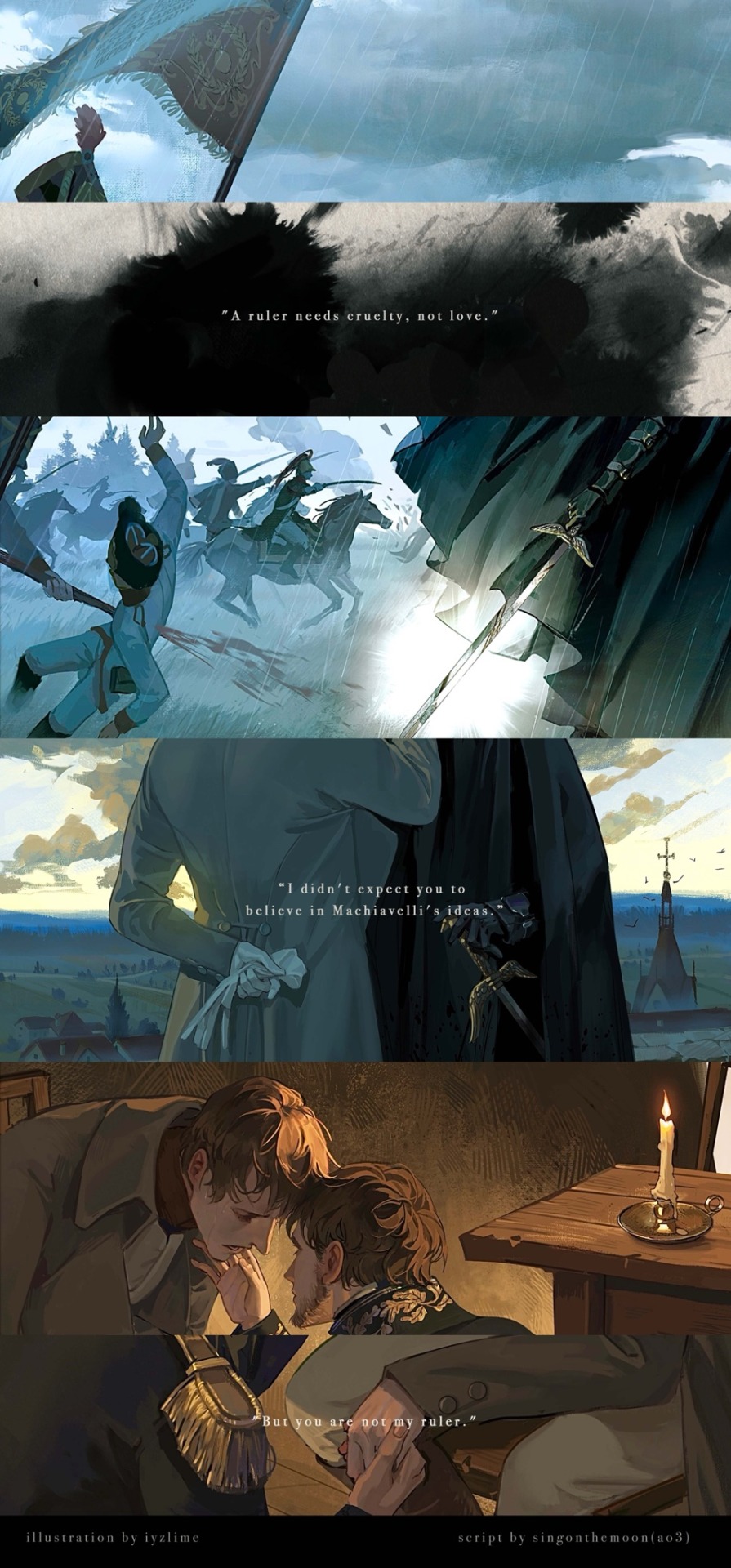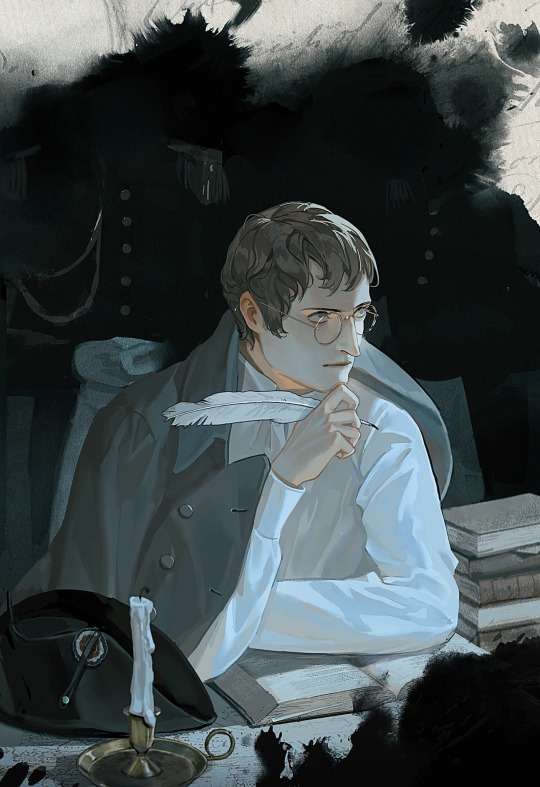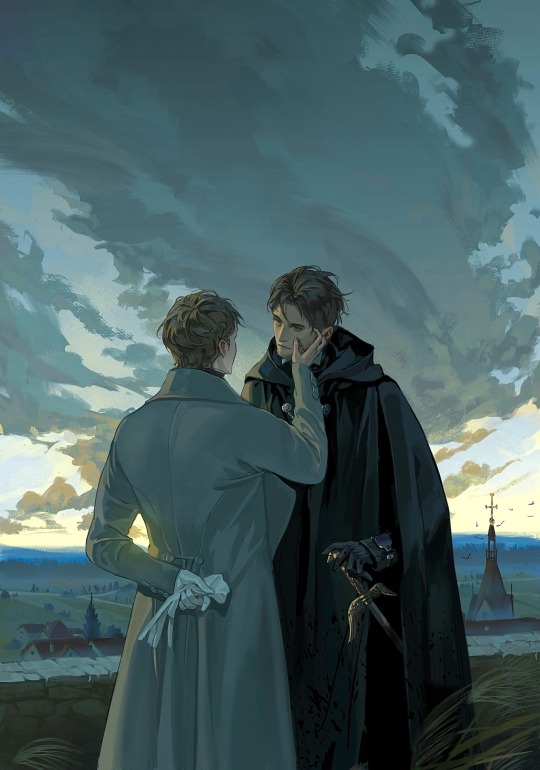Text

I heavy referenced an art so I don’t think I can post with tags.
Still a wip(maybe a doodle since it only took 25 minutes.)
30 notes
·
View notes
Text

Commission
44 notes
·
View notes
Text
i like when they make him look like this






114 notes
·
View notes
Text










I just discovered that napoleon was in the assassins creed unity game I never have played assassin's creed before so it came as a suprise to see photos of him in game on Pinterest i initially thought it was a mod or smth but no he really was in the game lmaoo
After watching some vids of him in game I do really think that assassin's creed did do napoleon pretty good personality wise definitely in that mission where your supposed to follow napoleon while he walking with a women and hearing how hes a terrible conversationlist with women I was chuckling the whole time hes so akward😭
I got all of my scenes from this video if want to check it out:
youtube
128 notes
·
View notes
Text





These are illustrations I created for the fanfiction Falling with You by singonthemoon on AO3. If you like my art and interested in the story please check out her amazing story on AO3, and give her lots of kudos, because she felt so upset that very few people read and like her stories even though they are so awesome! Thank you so much for your love and support❤️
ARNONAPO IS THE BEST!
428 notes
·
View notes
Note
What do you think about the relationship between Napoleon and Lannes? Were they like best friends or something? I read that when Lannes died Nap was really sad he cried and wasn't in a very good mood even after he returned home
Oh I love their friendship. Love their love. And they were intimately close. Terribly familiar and affectionate with each other (if in a bit of a rough-housey military sort of affectionate). Lannes was Roland to Napoleon’s Charlemagne. Patroclus to Napoleon’s Achilles.
They met as young men during the 1796 Italian Campaign and became fast friends. Both were from more modest backgrounds, both were stiff-necked and hard-headed, both had a military background, and so on. Lannes also fits into Napoleon’s category of “people he loved in part because they were there from the beginning”. Lasting sixteen years (and it would have lasted through to the end I think, had Lannes lived) their relationship was deep, intimate and meaningful to both.
Lannes was one of the few who could tutoyer Napoleon (in private and, more importantly, in public), and did so with great enthusiasm. He’s also one of the few who could publicly oppose/butt heads/insult/be overly familiar with Napoleon and not suffer any real consequences. (e.g. Lannes famously called Napoleon a harlot once in public. To which I am sure we can all hear Napoleon going: Fuck you Lannes. Lannes’ “punishments” when he overstepped the mark were either temporary banishment [it never lasted long] or being sent on diplomatic journeys he didn’t want to go on.)
They were what some would call intimate friends, or romantic friends.
Lannes’ death cut Napoleon to the core in a way that is only matched, I would argue, by Duroc and Josephine. Napoleon was mournful and grief stricken over others, such as Desaix and Chauvet, but not to the same degree or intensity.
(Desaix’s death did prompt that heartbroken line from Napoleon of (roughly) “he always wanted to die in battle but did death have to be so eager to grant him his wish”. Chauvet’s gave us that letter to Josephine where Napoleon says that Chauvet is dead, his ghost whistles through Napoleon’s tent.)
Indeed, in terms of displays of emotion on the battlefield, particularly open weeping and almost inconsolable grief, Lannes is one of the few that garnered such a reaction from Napoleon. (Duroc being another.) Which speaks to their profound relationship and what Lannes meant to Napoleon (and it certainly goes the other way around as well). Napoleon said of Lannes, “Lannes adored me…he was certainly one of the men on whom I could most depend in this world.”
Later on St. Helena: “he [Lannes] clung to me [Napoleon] … for the rest of his life; he wanted only me, thought only of me … Certainly, he loved his wife and children more than me; nevertheless, he never spoke about it because he expected nothing of it; he was the one who protected them, while in turn, I was his protector.” (A sort of military-esque marriage.)
One of my favourite exchanges, which can be summed up as: Presenting you the married couple of Napoleon & Lannes.
You damn Gascon! What the hell were you doing… trying to prove you’re so damn brave when we already know that? No… you were out there risking your men and yourself for no bloody reason! You’d do better to follow your orders from now on. When I want you to get yourself killed I’ll let you know!
– Napoleon to Lannes, after the takeing of Malta, 1798. Cited in The Emperor’s Friend: Marshal Jean Lannes
Mostly because you can hear Lannes yelling back: I DO WHAT I WANT YOU STUPID CORSICAN. Also because this is such a “I’m so panicked you almost died I love you and also want to slap you” moment from Napoleon.
Married Couple #2:
There were a few diversions, however, particularly the evening meetings of the savants who would later organize the Institut d’Égypte. Bonaparte took these meetings seriously and made his generals and staff attend. He could not always control such a diverse crowd, however. Several officers were unimpressed and obviously bored with scholarly discussions. A participant claimed Lannes and Junot were the worst behaved, joking with each other and making rude remarks while the savants attempted to educate them. Junot would deliberately mispronounce Lannes’s name as one of his better jokes, calling him l’âne, or ass. Lannes told Bonaparte that nobody could hear the scholars over Junot’s snores rumbling from the back of the crowded gathering. Bonaparte excused Junot from further sessions, but he made Lannes stay, fidgety, bored, with no one to listen his sotto voce comments.
— Margaret S. Chrisawn, The Emperor’s Friend: Marshal Jean Lannes.
Junot and Napoleon though, that’s another complicated situation. (It was a mess, a hot, hot mess. Junot was in Love. Napoleon was embarrassed. It got messy and mean.)
A few accounts from Lannes’ death:
As soon as the Emperor saw him, he ran, hastened to him, covered him with kisses. He called to him in the middle of his sobs, and said to him in a muffled voice: ‘Lannes, my friend, do you recognize me? It’s me, it’s the Emperor. It’s Bonaparte, your friend!’ … Napoleon, kneeling before the dying hero, cried hot tears. This most touching meeting, these most tender embraces moved us profoundly … The Emperor’s pain was so intense that none of the witnesses to this scene could ever deny the profound feeling that it inspired.
– Account from Jean-Jacques-Germain Pelet
“My Cousin, the marshal died this morning of wounds he received on the battlefield. My grief is equal to yours. I lose my armies’ most distinguished general, my companion in arms for the last sixteen years, the one I considered my closest friend. His family and his children will always have a particular right to my protection. It’s to assure you of this that I wanted to write you this letter, because I sense that nothing can relieve the true sorrow that you will feel.”
— Letter from Napoleon to the Duchess of Montebello, 31 May 1809.
Following Lannes’s agonizing death on May 31, 1809, Napoleon retreated to his tent where his valet Louis Constant later found the Emperor “seated, immobile, mute, and staring into space, in front of his hastily prepared meal. Napoleon’s eyes were inundated with tears; they multiplied and fell silently into the soup.”
[…]
Napoleon’s grief for Marshal Lannes took on the very public character of open lamentation. Rather than grieve behind closed doors and conceal his personal vulnerabilities in order to show public strength, Napoleon’s mourning for his beloved friend became a matter of great public spectacle. Like Achilles mourning his beloved Patroclus, Napoleon wept publicly and openly expressed his affection in a way that was widely reported, discussed, and admired by the officers and soldiers in his armies.
[…]
Napoleon’s public grief at the death of Jean Lannes represented a new model for social relations between soldiers in the early nineteenth-century France. weeping over his friend’s broken body, Napoleon demonstrated how the revolution and empire had made it possible not only for an emperor to grieve openly for a fallen marshal, but for a soldier to love his comrade. This uncharacteristic expression of affection between Napoleon and Lannes was echoes in similar relationships between officers and foot soldiers in Napoleon’s armies. Military memories of the first empire bear witness to a wide range of intimate relationships among generals, colonels, and captains as well as sergeants, corporals, and grunts (grognards), the infantry soldiers who made up the majority of the imperial armies. Napoleon’s love for Lannes might thus be said to represent a broad spectrum of masculine affection and intimacy in the ranks of the Grande Armée, or what could be called Napoleonic friendship.
- Napoleonic Friendship: Military Fraternity, Intimacy, and Sexuality in Nineteenth-century France
“The Emperor also spoke of the last moments of Marshal Lannes, the valorous Duke of Montebello, so justly called the Roland of the army, who, visited by the Emperor on his deathbed, seemed to forget his own condition and tend to him whom he loved above everything.”
-Las Cases, Memorial of Saint Helena.
Indeed, Napoleon’s friendship and open pain and grief at Lannes’ death is one of those rare moments that allows us to separate the Napoleonic Myth - that enigmatic Emperor who is a repository of collective fears and hopes - and see the man beneath it. And while, as with everything relating to Napoleon, his friendship with Lannes can be either over, or under, stated - I think we can all safely agree that there was love, intimacy, affection and friendship between them and Lannes’ death impacted Napoleon in a way that I’m not sure we can fully appreciate.
Until the end, whenever Lannes was brought up Napoleon would discuss him briefly then quickly move on to other subjects and it’s clear, based on how he is described in those moments (going silent, blinking a lot, looking away), he’s trying not to cry.
186 notes
·
View notes
Text

whatever i could cook up/doodle under 10 minutes for this stinkers bday
252 notes
·
View notes
Text

(Repost uhm ye) my friend request draw nelson

+bonus my classmate's oc
5 notes
·
View notes
Text

my unfinished wip of junot lol
86 notes
·
View notes
Text

LANNES!! hes so schmookie
And bonus 👇

Dog
76 notes
·
View notes
Text




More doodlessss because they’re all I can think about rn
158 notes
·
View notes
Text
“Lightly he was constrained to look upon light women, but when he met and admired the virtuous, he offered them all the honour he could spare. His love and admiration of the Duchess of Devonshire did not blind her to his faults, but her analysis of his conduct was impartial, regretting that his “aptitude to yield over his better opinions to foolish and even ridiculous counsellors, if they happen to convince him, and the same facility that made him promise places has driven him into Society and manners unworthy of him, for his talents are good and his deportment superior in grace to anything I ever saw. And however he may have appeared to deviate from strict honour or to be caprious and unsteady, I cannot believe his heart to be bad, and he has obeyed the star of the moment which has been in general malignant.””
— Excerpt from “George the Fourth” by Shane Leslie, 1926 (via decadent-empress)
19 notes
·
View notes
Photo



Miniature portraits of George IV when Prince of Wales by Richard Cosway. 1780′s.
80 notes
·
View notes
Photo

King George IV, after Thomas Clement Thompson, 1825
12 notes
·
View notes
Text

Princess Elizabeth to the Prince of Wales
Queen’s Lodge, Sunday evening [? 26 June 1796]
As I have an opportunity of writing to town, I could not possibly let it pass without sending a few lines to you, my most beloved brother, for you shall never have it to say you have experienced ingratitude from me. I have certainly nothing to say, & your mind has been too much oppressed with vexation for me to weary you with letters, but not having seen you as I flattered myself hoping all this to have been over by this time, I postponed writing that I might have expressed by word of mouth the unbounded affection of my heart. I can assure you you are our only topick of conversation, for we are all truly miserable about you, & the first question in the morning & the last at night is, have you heard anything from Richmond or London? We are however constantly looking forward to our seeing you again, & when night comes I cannot help thinking another day is passed, so we are nearer that happy & anxious period. Mama looks better, mais elle vous aime plus que sa propre vie, ainsi elle souffre et cruellement, mais le bon Dieu nous protegera, et l’esperance nous est encore laissé. For us poor girls we have all heavy hearts on your subject, but we talk you over & over again, from which we reap comfort, otherwise we are very sad indeed.
We were blessed with the sight of your image, your sweet little girl, who, though I rejoiced to see, made me feel a pang of grief such as I never before had swallowed; I felt that my love was such for you that I could sacrifice my life with pleasure if I could but administer comfort into your distressed mind.
Do excuse & pardon me if my letter is full of nonsense, for I really write just what is dictated by an unaffected heart which is totally devoted to you. My sisters desire their kindest love & hope with me that we shall soon see one another again. God bless you [etc.].
7 notes
·
View notes


